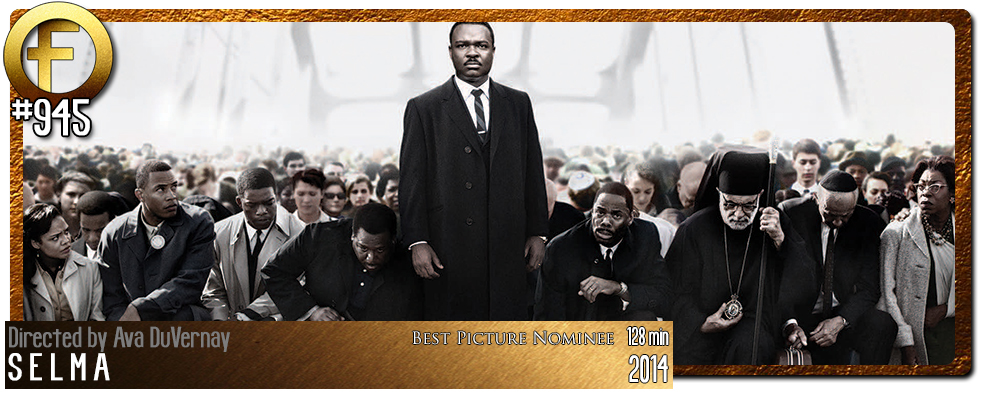Movie Review – Selma
Principal Cast : David Oyelowo, Tom Wilkinson, Tim Roth, Common, Ruben Santiago-Hudson, Carmen Ejogo, Lorraine Touissant, Oprah Winfrey, Cuba Gooding Jr, Alessando Nivola, Niecy Nash, Giovanni Ribisi, Keith Stanfield, Andre Holland, Tessa Thompson, Nigel Thatch, Michael Sheen, Dylan Baker, Michael Papajohn.
Synopsis: The story of Martin Luther King and the marches from Selma to Montgomery, Alabama, in the name of voting rights during the 1960’s.
**********************
Woulda made a great Michael Jackson song.
Selma’s existence would seem, to the outsider, to be Oprah Winfrey’s mission in life to snag herself an Oscar. After The Butler failed to garner the big gongs in 2013, 2014’s “Black Message Movie”, Selma, based on the march of black protesters to gain the right to vote, is purpose built for critical acclaim. Trouble with films designed as Oscar bait is that often they fail to do justice to the story they’re trying to tell purely because they’re trying too hard. Winfrey’s producer role in Selma could be seen as another hit at Oscar (she won’t win it, because there are other films around in 2014 that far outstrip Selma’s grand plans for racial equality) but does that make the film less worthy as a work of art? Selma’s timing couldn’t be more perfect. 2014 was a horrible year for race relations in America. The uprising in Ferguson, Missouri, where an unarmed black teenager was shot dead by a white police officer – who would go without charge or trial, sparking outrage by sectors of the community – and the captured-on-camera death of an unarmed black man on the streets of New York City, by a white police officer, for an offense so unremarkable it’s outrageous with its indifference, catapulted the gap between white America and black America firmly into the world spotlight. For a country led by a black president, the irony wasn’t lost on many. Selma, another in a long line of racially charged cinema outings over the last decade, is perhaps a victim of its own timing more than anything the film-makers do right or wrong. The problems Selma has aren’t so much creative, rather they’re indifference considering the status of American blacks today.

I’m not entirely sure Selma would make a great Oscar film. It’s too…. Oscar-y, too much of an ovation to itself, to mark it as significantly different to other films showing similar thematic material. If it weren’t for the events in Missouri and New York through 2014, I doubt we’d be talking much of Selma’s Oscar hopes come awards season; I think it’s too showy and too precise to be much more than a markedly costly Hallmark movie. Harsh? Perhaps, but in that good old “cold hard light of day”, I felt Selma was trying too hard to please instead of just getting down to business on its own terms. You could almost feel the film-makers sitting around the monitor wondering how technically precise they could get to make this one an Oscar worthy contender. Hey, I’m as much in favor of racial equality across the globe as the next person, so don’t take this as a nit-pick on Selma’s racial themed narrative, but in aiming to make this as politically powerful as possible, the film loses steam through wallowing in overly serious preponderance of action. Selma’s a serious film, sure, but the desperately depressing nature of the topic at hand feels cajoling towards “powerful” rather than organic.
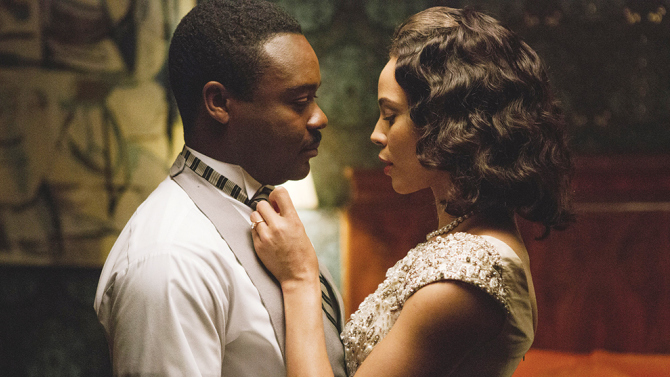
With every minute that passes by, and the dreary intonation of the characters inflected with importance (as unrealistic as it is) and social meaning, Selma becomes less a film about people, and more about characters of people. The cast do their damnedest, but I didn’t but the film’s serious tone with anything other than an unsettling layer of “look at me, aren’t I important”. David Oyelowo makes a convincing Martin Luther King, and imbues the role with dramatic heft I think only Denzel Washington could convey (speaking of, I half expected Washington to appear in this – he doesn’t), while Carmen Ejogo is suitably rock solid as King’s wife. Tom Wilkinson’s portrayal of President Lyndon B Johnson, who stonewalls the attempts by the civil rights movement to garner the right to an unfettered vote, seems a tad presumptuous, but then this is a film designed to make us hate historical influence all that much more.
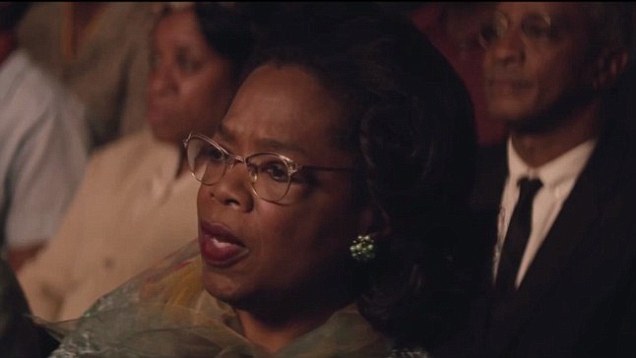
The rest of the cast, from Oprah Winfrey, Common, Tim Roth and even Giovanni Ribisi, among others, flesh out their roles as best they can amidst the brown-toned dusky visual style, but with such a cluttered ensemble vying for screen time, each character – particularly Oyelowo’s King – is lesser developed than they ought to be. Historical films often resort to visual shorthand to depict a character’s faults and foibles, partly due to the fact that films of this nature depict real people as best they can in light of anecdotal evidence, and that makes our coloring of each character’s soul through this, the only method we have to bring them to life. I know, intentions stand for a lot in films of this nature, depicting human intolerance, racial segregation, but you know what they say about the road to Hell. The film lumbers through strategic impact, key moments in King’s career as a civil rights activist depicted with a sombre, overly reverential manner designed purely to escalate the moral conscience without ruffling people’s feathers. A film like this should hit hard – Selma doesn’t hit hard enough.
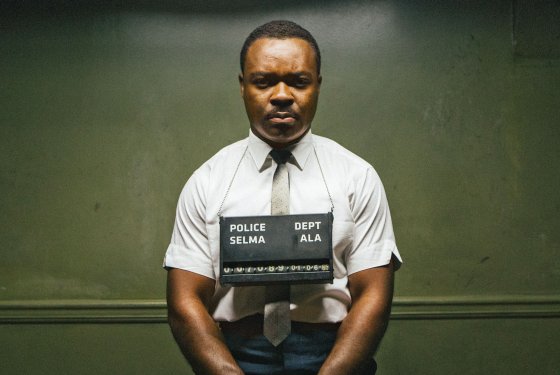
Now, before you malign me for watching a different film to you, consider this: what makes a great film great? Is it the acting, the story, the fact that it lingers long in the mind well after watching? Truth be told, it’s probably all of that, and Selma tries hard to dig itself into our consciousness like a tic under the skin; Selma’s brave narrative lacks any sense of tension, laying itself out like a “dramatic recreation” rather than the rumbling social unrest it deserves. The direction by Ava DuVernay, whilst commendably stately, seems too restrained, too restrictive on the viewer, to really elevate the material. It’s good material, yes, and although the script feels like a join-the-dots racism piece, it could have been so much more potent in the hands of a director capable of pulling out a more focused story.
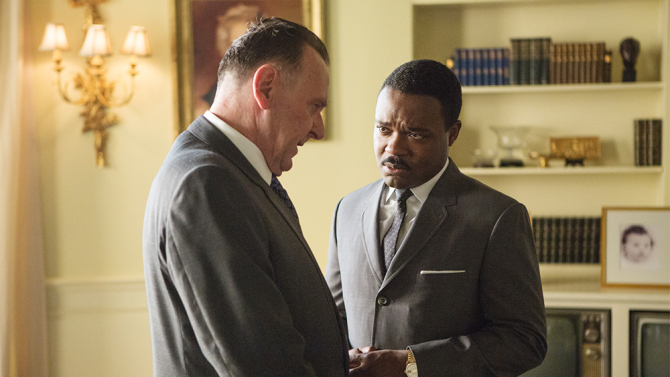
With its wide-screen focus on the broad-strokes narrative, Selma undercuts itself through over-achievement. Gathering a great cast, and depicting pivotal moments in the civil rights movement during the flashpoint of America’s 60’s upheavals, Selma should have been a stronger dramatic piece. There’s a flatness to it all, a sense that those involved know they’re depicting real people and not actually depicting real people. Playing pretend is only so good – in order to play real people, you need to stop “acting” and just bring them to life. You can see the seams of the “acting” in Selma loud and clear, and with the exception of Oyelowo and Wilkinson, I couldn’t see anyone else as just the actor saying some lines and stuff.
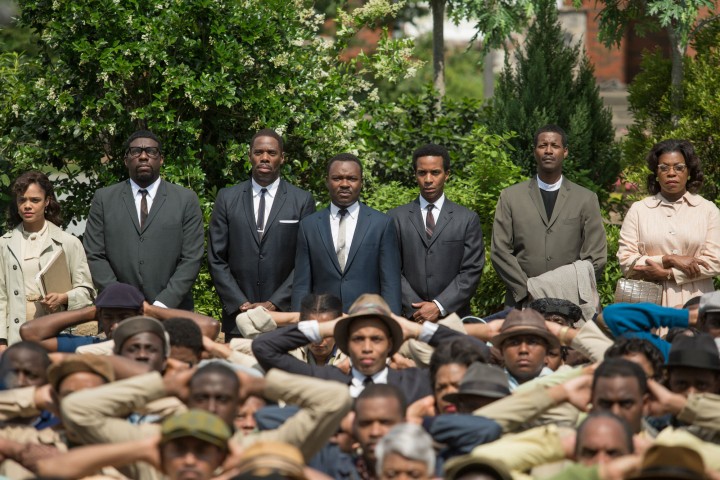
A few folks I know have compared Selma to films like 12 Years A Slave, or even Oprah’s previous production, The Butler. Where The Butler was equally as contrived, 12 Years A Slave soared with its depiction of the oppressed black man. How are three films, tackling similar subjects, so different in outcomes? Selma’s desire to soar is unequivocal, as is the fact that it just doesn’t, through no fault of the cast. The fact is, films like Selma need to be more than just a depiction of history; they need to make their participants feel real, feel fleshed out (more than the real people they depict often are in history books) and in my opinion, Selma doesn’t do that. It delivers a few punches here and there – an opening desecration on childhood innocence is particularly shocking – but the overall feeling is that Selma has supplanted character for propaganda.
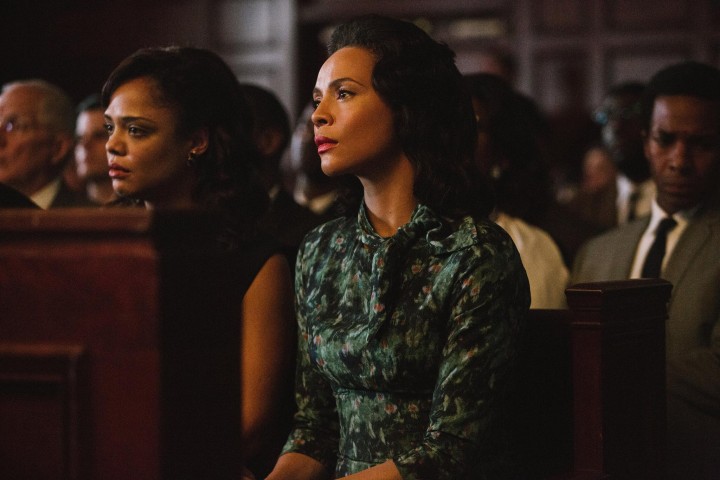
Of all the 2014 films I had hoped would reveal themselves as superior, Selma was the one I was most concerned about. I had expectations for this film, and as a fan of this period of American history, I hoped that it would do the story justice. On a superficial level, it does, just not with the verve and tenacity I felt the story deserved. Plain direction against some decent acting brings Selma down several notches, and the tear-jerking hodge-podge of social injustice reeks of “awards season sermonizing”. Hollywood loves a good “message” movie. It loves a good film that tells of injustice and the fight to stop it. Selma will undoubtedly be applauded across many a social, ethical, and humanitarian spectrum, as it rightly should. Does this make it a good, great, or magnificent film? Unfortunately, I didn’t find Selma any better or worse than many of the films that tell similar stories. It’s indifference that strikes at the heart of Selma. The film feels indifferent, feels half-cocked. Story and thematic excellence aside, Selma is a feel-bad through-line into the heartland of racism and bigotry, yet never elevates itself with hope or King’s own “Dream” of a better world.

